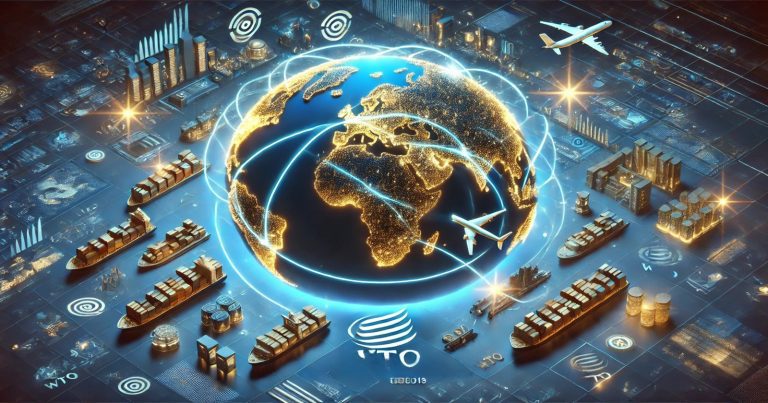The World Trade Organisation works to facilitate and regulate international trade. It is the one global institution aimed at regulating relations between nations by providing rules, settling disputes, and lowering trade barriers to ensure ease in trading between respective countries. Functions of the WTO thus include rule formation and negotiations concerning international trade relations, mediation of disputes regarding international trade relations, and promoting fair competition amongst all members. This means that the WTO is concerned with the efficient functioning of global trade, which brings up a particular country’s economy to speed.
The WTO was set down to stabilise the trade economy and enable free trade by lessening restrictions. The goals of the WTO shall be to liberalise trade, improve economic growth, and boost the trade involvement of countries. Understanding WTO principles will evolve into understanding the world economy as we see it today. This article will study the World Trade Organisation’s objectives, functions, principles, advantages, and impacts on international trade.
What is WTO?
The WTO full form is World Trade Organisation works. It is the only international body that oversees the global trade flow. It ensures revenues flow smoothly, freely, and predictably amongst governments and mediates between conflicting ones. Formally recognised on January 1, 1995, it succeeded GATT (General Agreement on Tariffs and Trade) 1948-1994.
World Trade Organisation functions seek to stabilise the international economy, promote cooperation between countries, and ensure the non-discriminatory working of trade policies. An important function of the World Trade Organisation is to provide a stable environment for trade negotiations and dispute settlement. In general terms, the functions of the World Trade Organisation promote the reduction of trade barriers, fair competition, and the growth of both developing and developed countries.
The World Trade Organisation and global trade are intertwined; the WTO provides the rulebook by which countries deal with one another on the world market. The WTO also maintains its role in administering World Trade Organisation agreements to ensure that international trade policies are mutually transparent and advantageous.
World Trade Organisation Definition
The World Trade Organisation is a global international organisation that regulates trade relations among member nations. It provides a forum for governments to negotiate trade agreements and to settle disputes.
The WTO functions as an international trade entity by ensuring that goods and services are unreasonably restricted in their cross-border movement. It stands for fundamental characteristics like openness, security, and non-discrimination. The WTO System promotes fair competition, intellectual property protection, and economic cooperation.
Features of WTO
- Binding agreements: Trade negotiations under the auspices of WTO result in legally binding contracts that countries must abide by.
- Trade liberalisation To do so, the WTO wishes to reduce tariffs and trade barriers.
- Dispute settlement: WTO mediates and resolves conflicts if a country violates trade agreements.
- Economic advancement: WTO provides a conducive environment for trade, thereby allowing countries to build their economies.
These functions of the World Trade Organisation affect not only trade but also employment, international relations, and the general economy. WTO supports trade as an engine of economic growth, ensuring that such growth benefits all members, especially from developing nations.
Functions of World Trade Organisation
The World Trade Organisation’s functions revolve around trade facilitation, dispute settlement, and global economic prosperity. These functions ensure that all countries engage in fair trade and in keeping with established trade agreements.
Establishing and Maintaining Trade Agreements
Another core function of the World Trade Organisation is to develop and maintain WTO trade agreements covering various areas, such as goods, services, and intellectual property. WTO acts to ensure that agreed rules are not being transgressed by the member countries involved in the trade and that no unfair trade barriers are imposed on them.
It is important because it allows countries to unite during trade negotiations under WTO auspices. And the agreements negotiated there, thus endowing them with clarity and legal undergirding, ensure that the relationship remains trouble-free.
Resolving Trade Conflicts
Trade disputes happen when countries unfairly impose tariffs, quotas, or other restrictions on trade. WTO dispute settlements address these through neutral investigations and judgments.
One WTO function in international trade would be to ensure that trade disputes do not escalate into bigger conflicts. The benefits of the World Trade Organisation’s functions include holding peace and cooperation by mediating cases entailing conflicts with trade.
Monitoring Global Trade Policies
The World Trade Organisation and global trade are interrelated because the WTO monitors trade policies, so there is no unfairness. A guiding principle of the World Trade Organisation is transparency and predictability; therefore, if a sudden trade barrier is imposed, there can be no good reason for any other country not to react.
Countries send regular notifications on their trade policies, making it easy to observe certain prevailing trends and help curtail any likely abuses. This creates confidence between nations and promotes economic integration.
Reducing Trade Barriers
Besides that, the World Trade Organisation works by minimising trade barriers such as tariffs, quotas, and subsidies. The WTO promotes free trade among countries, which optimally balances economic growth.
The World Trade Organisation performs economically by allowing for lower prices because of competition, increasing production through competition, and providing product selections to consumers.
Helping Developing Countries
WTO plays a vital role in developing countries’ economic development. The WTO helps foster development through technical assistance, training programs, and policy guidance concerning trade and development among world regions. So, the WTO encourages an Aid-for-Trade- Quebec-based program to foster developing countries’ trade performance by improving trade and reducing trade costs; thus, the WTO works to increase developing countries’ participation in the world trading system.
Role of WTO
An Organisation is essential in promoting fair and free trade among nations. It is crucial as a foundation for all economic cooperation and a principal facilitator in maintaining stable global trade relations.
Regulating International Trade.
The World Trade Organization is, thus, concerned with the smooth functioning of international trade and has as its objectives the regulation of trade agreements intended to create predictability in global trade conditions. By setting rules for general international trade, which all member nations must abide by, the WTO prevents the development of reports that trade restrictions, import bans, discrimination due to tariffs, or the like amount to unfair practice.
The World Trade Organization, as an institution, ensures agreements among countries through its several modalities, considering the principles already laid down in its agreements about the need for ethical trade and transparency in trade for all countries. The principles emphasise non-discrimination, fair competition, and market access, which thus create a level playing field for businesses worldwide.
Settling a Trade Dispute
The World Trade Organisation dispute settlement mechanism plays a great role in resolving trade problems. When two or more countries have a dispute over tariffs, quotas, or import/export restrictions, the WTO comes in as a mediator.
The nations state their complaints to the WTO, and an independent panel analyses the case and ensures compliance with fair trade practices. If a country disobeyed the trade rules, the WTO forcibly issued penalties to maintain order in the global trade system. Thus, no country can exploit others through unfair trade restrictions.
Promoting Free Trade and Economic Growth
One of the most important roles of the World Trade Organisation is free trade and economic welfare. WTO negotiates trade agreements that reduce tariffs, remove trade barriers, and open markets to foreign businesses. The WTO is also involved in developing countries and is a major player in economic development affairs.
WTO contributes to developing countries’ contributions so that due processes are available for hosting benefits from being integrated into the global economy. This will happen through special agreements or trade policies that allow these cutting-edge development economies to access the markets better, raising national development levels regarding trade and economic volumes.
Monitoring and Reviewing Trade Policies and Practices
The WTO reviews and monitors its members’ trade policies continuously. Countries must submit trade reports regularly. Country reports detail the policies and trade measures they undertake. It protects against excess tariffs, dumping, and subsidies through transparency.
The World Trade Organisation, and indeed global trade, goes into close contact with one another, as the WTO enables both stable international trade and transparency and predictability of operations.
Importance of World Trade Organisation
The activities of the World Trade Organisation include policy-making, dispute resolution, technical assistance, and economic cooperation. Activities undertaken by the WTO actively work to strengthen global trade relations and promote economic development.
Conduct of Trade Negotiations
Trade negotiations are often held in the WTO among member countries. The talks deal with trade policies, tariffs, and regulations regarding markets. They are multilateral in alleviating trade barriers and improving international business conditions.
The most important role of the World Trade Organisation in trade negotiation is to bring countries close to each other for fair discussion. Such meetings would produce binding agreements against which trade relationships and economic policies are assessed.
Resolving Disputes Related to International Trade
The WTO has established a well-organized machinery for dispute settlement for its members. Such a grand machinery is used to settle trade disputes at the national level. This is an honourable way for countries to sort the matter diplomatically.
If a trade agreement is breached, the WTO investigates and, where appropriate, imposes a sanction or penalty against the culprit. Thus, the framework ensures that all countries adhere to the same standards and that no country can violate the rights of another.
Assisting Developing Countries
The WTO actively assists developing countries through technical assistance, training in trade-related matters, and provision of financial resources. The undertaking of these programs helps to formulate legitimate trade policies that may, first, work in low-income countries and, second, expose them to global trade.
The Organisation benefits developing countries by looking after their interests in accessing global markets, nurturing them to reduce export restrictions, offering technical assistance in developing policy frameworks for trade strategy, and in special agreements where preferential treatment of exports has been made.
Environmentally Sustainable Development and Fair Trade
The scope of WTO does not bode well for the fact that it is a contributor to economic progress. The activities of WTO are not limited to the fosterage of practices conducive to trade but are replete with principles germane to an environmentally friendly, sustainable approach to trade. In this regard, además, some international agreements should obligate nations not to engage in harmful practices, such as illegal fishing, deforestation, and excessive carbon emissions.
The sustainability efforts support the idea that future generations should enjoy the fruits of trade while protecting nature.
Strengthening Global Trade Relations
The World Trade Organisation and global trade work hand in hand to increase nations’ economic cooperation with an extended framework for trade between governments, trade-related organisations, and businesses to enact fair trade practices on behalf of every party concerned.
The framework allows the lowering of trade boundaries and promotes economic stability in the long run through cooperation and economic integration.
Impact of WTO
The impact of the World Trade Organisation is felt worldwide, exporting across the markets and into international trade, economic development, and market stability.
Increase in Global Trade Volume
One of the significant advantages of the World Trade Organisation is that, at a very basic level, international trade has increased significantly. The WTO permits businesses to trade with lower tariffs and without trade barriers, thus opening up markets across borders.
Growth in the Global Economy
The effects of growing world economies on the economic development of the WTO are evident from the improved and steady economic growth that member countries record. WTO encourages investment and free trade, which leads to more foreign investments and industrialisation, thus enhancing employment creation.
Trade Barriers Reduction
The WTO has played a vital role in reducing trade barriers so that business activities cross borders with minimal restrictions. The agreements of the World Trade Organisation entrench fair trade policies in member countries, which are vital for economic stability and growth of the business sector.
Dispute Settlement Strengthening
The World Trade Organisation’s dispute resolution mechanism has considerably lessened conflict incidence by providing a neutral ground for trade negotiations. Otherwise, major wars with all their implications would have erupted in trade disputes, with global issues resolved equitably.
Better Circumstances for Developing Country
World Trade Organisation has made a positive impact on developing countries. The WTO gives assistance and technical support to developing countries so that they can market their products worldwide.
Benefits to Consumers
The positive effect of the World Trade Organisation on consumers shows its importance. The WTO allows people to buy goods at lower prices through tariff reductions. With an increase in the availability of products, consumers are better able to make choices and buy quality products.
Functions of WTO FAQs
1. What are the functions of the World Trade Organization?
Functions include establishing trade rules, settling trade disputes, monitoring trade policies, reducing trade barriers, and assisting developing countries. These functions are meant to enhance the global economy’s stability and free up trade worldwide.
2. What is the role of the World Trade Organisation in global trade?
The role of the World Trade Organisation is to ensure that there are no restrictions or barriers to trade among the countries to operate a fair and smooth trade. WTO rules trade, forbids unfair constraints, and solves conflicts between member states.
3. What are the advantages of World Trade Organisation to developed countries?
The benefits of the World Trade Organization to developing countries include assistance for trade, access to world markets, and opportunities for economic growth. WTO would assist developing countries in learning to take part in international trade.
4. What are the implications of the World Trade Organization on economies?
Implications of the World Trade Organization include trade cost elimination, wider access to markets, increased consumer choice, and economic stability. The WTO guarantees fairness and transparency in all trade policies.
5. Explain the WTO settlement of trade disputes.
The WTO dispute settlement system considers trade disputes and gives judgment on them to determine a solution for the conflicts thus created. Such judgments are binding upon states and ensure fairness in international trade.


